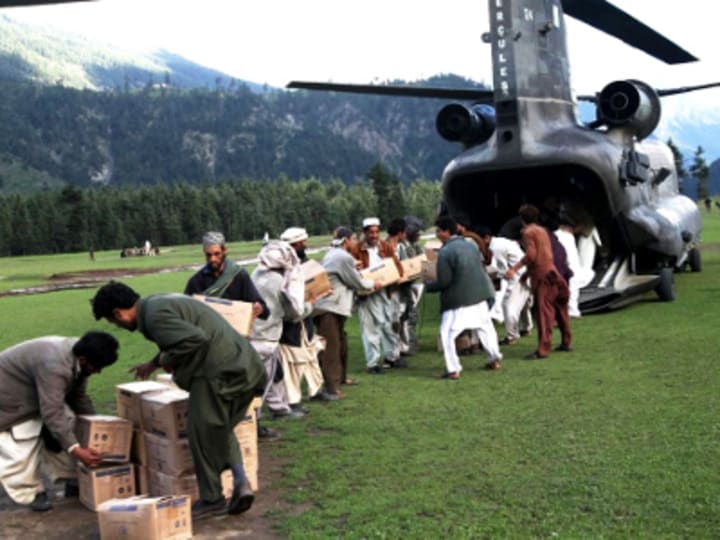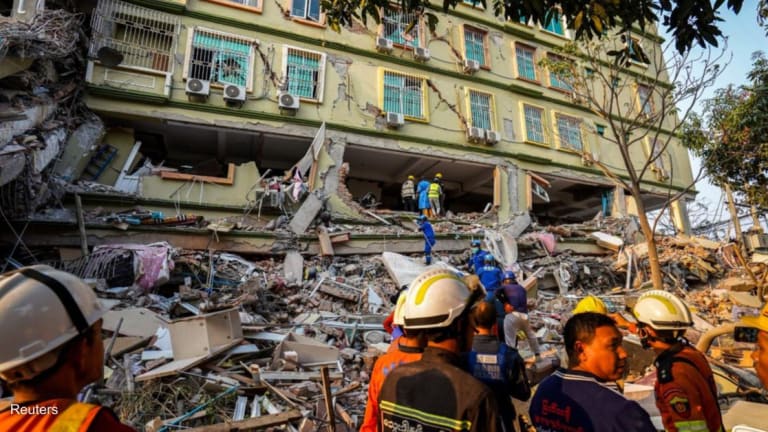
More than two weeks into the fatal monsoon floods and a week after the United Nations aid appeal for USD459.7 million, aid experts and the media are trying to analyze why aid for Pakistan’s flood victims has been sluggish.
The disaster is bigger in size and scope compared to the 2004 Asian tsunami, 2005 Pakistan earthquake and 2010 Haitian and Chilean earthquakes combined, according to news agencies. But the response to this latest catastrophe is nowhere near as fast as the outpouring of sympathy and aid money for the aforementioned calamities.
“[The floods] are only surpassed by the 2004 floods in Haiti. Donations from governments for the victims of that disaster topped $495 per affected person, according to Oxfam. The floods in Pakistan have been making headlines worldwide for more than two weeks and yet so far donations are only around $3 per person,” writes Rajeet Ghosh for Reuters.
Pakistan’s “image deficit” is partly to be blamed for the slow donor response, aid agencies say.
Donors have so far contributed or promised USD125 million or 27 percent of the U.N. aid appeal launched Aug. 11, according to the U.N. Office for the Coordination of Humanitarian Affairs.
“We note often an image deficit with regards to Pakistan among Western public opinion,” Elizabeth Byrs, spokeswoman of U.N. OCHA, was quoted by AFP through the Financial Post. “As a result, Pakistan is among countries that are poorly financed, like Yemen.”
“There are concerns expressed within the Pakistani community both here and back home (Britain) with the level of corruption in the country. People feel that if they give, it will not go to the people in need,” said Neva Khan, Oxfam’s director in Pakistan, as quoted by Reuters.
“A leading philanthropist and financial executive claims that there are several reasons that the world isn’t responding to Pakistan’s woes. First, this is the fifth year running that Pakistan has been asking for funds: 2005 and 2006 for earthquake relief, 2007 to 2009 due to the war on terror and economic collapse, and now again for flood relief,” writes Pakistan-based journalist Osama Javaid for Atlantic-Community.org. “Additionally, there is the perception that the rich and powerful in Pakistan are not doing their share, so why should the foreigners pick up their burden. There is also a lack of trust that the money will be utilized honestly and efficiently.”
The relatively low reported death toll of 1,463 – according to estimates of the National Disaster Management Authority as of Aug. 14 as reported by CNN – as well as the gradual onset of flooding have contributed to the slow donor response, CBC News reports.
“The international community has been slow off the mark and it is perplexing as to why. I think they took their eye off the ball and didn’t realise how big it was and didn’t act quickly enough,” Oxfam’s Ian Bray was quoted by Mirror.co.uk.
Low-key media coverage
Molly Kinder, a Pakistan aid expert with the Center for Global Development, points to the relatively low-key coverage in the international media and lack of celebrity involvement as factors that have prompted a less generous response from donors, the AP through CBC News reports.
This observation was echoed by Naseer Warraich of the Association of Pakistani Canadians, who, in an interview with the Globe and Mail, noted that, after the Haitian earthquake, most media outlets quickly dispatched a number of correspondents to the disaster zone. In comparison, coverage of the Pakistan floods’ immediate aftermath was not as extensive.
On the other hand, Nick Moyer, coordinator of a humanitarian coalition comprised of Care Canada, Save the Children, Oxfam Canada and Oxfam-Quebec, said distance, culture and language all play a role in the flow of information about the disaster. He told the Globe and Mail that Pakistan is several time zones away, which affects information-gathering and dissemination.
“Heart-wrenching” destruction
British Deputy Prime Minister Nick Clegg said contributions to relief efforts in Pakistan have been “absolutely pitiful.” The U.K. has so far committed 31.3 million pounds (USD49 million) to assist the Islamic nation.
“The response from the international community as a whole, however, I have to say, bluntly, has just been lamentable. It’s been absolutely pitiful,” Clegg was quoted by BBC.
United Nations chief Ban Ki-moon was apalled by the destruction caused by the fatal monsoon floods in Pakistan, describing his visit to the flood-ravaged nation as “heart-wrenching.”
“I will never forget the destruction and suffering I have witnessed today. In the past I have visited the scenes of many natural disasters around the world, but nothing like this,” he said Aug. 15 in a news conference after travelling to flood-affected communities.
Ban called on donors to expedite the delivery of aid. He said a further USD10 million from the U.N. Central Emergency Response Fund will be allocated for Pakistani relief efforts, bringing the total disbursement since the onset of the crisis to USD27 million.
Floods to take their toll on Pakistan’s economy
President Asif Ali Zardari said it will take up to two years for his nation to recover from the disaster, according to the Associated Press through The New York Times. Rebuilding the flood-ravaged nation will need some USD10 billion to USD15 billion, Wajid Shamsul Hasan, Pakistan’s high commissioner to the U.K., told Reuters. The figure, he said, is a rough estimate since a damage assessment has yet to be conducted.
The disaster is seen to take a toll on Pakistan’s economy, food supply and political stability.
“There was a first wave of deaths caused by the floods themselves,” U.N. spokesman Maurizio Giuliano was quoted by The New York Times. “But if we don’t act soon enough, there will be a second wave of deaths,” due to scarce potable water and food supplies, and diseases transmitted by water or animals.
Zardari has ordered an early assessment of the damage caused by the monsoon floods, which should be completed as soon as possible to help make “a correct and credible assessment of the relief needs as well as ensuring that relief goods reach the right people in a timely manner,” CRWE Newswire reports. The Pakistani president also plans to seek the assistance of international institutions such as the World Bank and Asian Development Bank for damage and needs assessment.
Zardari’s visit to Europe
Zardari has been criticized for pushing through with his state visit to Europe as the disaster was unfolding. But the president’s gamble seems to be paying off, according to New Pakistan’s Junaid Qaiser, citing the outpouring of assistance for Pakistan.
“President Zardari knew it was a gamble to go overseas to raise awareness for Pakistan. He was sure to be slammed by the media, but he was going to get slammed no matter what. The only hope he had was that his international trips would pay off for the people of Pakistan,” Qaiser said.
Apart from Ban, U.S. Senator John Kerry is also set to visit the Asian nation this week to help raise awareness on humanitarian needs and discuss how the USD7.5 billion civilian aid program - authored by Kerry and U.S. Senator Richard Lugar - may be recalibrated to cover flood-related needs, Voice of America reports.
The World Bank also vowed to commit USD900 million for relief and reconstruction efforts in Pakistan, the ministry of finance announced, and will conduct a damage and needs assessment this week, Dawn.com reports.
Norway is also increasing its assistance to Pakistan to 100 million kroner, which will be channeled through U.N. humanitarian agencies, the Red Cross and other non-governmental organizations.
The Swiss government increased its contribution to the World Food Program to 1 million francs (USD964,001) and the International Committee of the Red Cross to 3 million francs to help address relief needs in Pakistan.
Canada pledged to provide as much as 33 million Canadian dollars (USD31 million). Of the sum, 25 million Canadian dollars will be coursed through the Canadian International Development Agency. The remaining 8 million Canadian dollars, which will be provided through the Global Peace and Security Fund, managed by the Department of Foreign Affairs and International Trade, will be allocated in two phases to help dole out equipment including tents, water purification and other equipment for life support.
Australia says it will provide an additional 24 million Australian dollars (USD21 million) for humanitarian efforts in Pakistan, the Herald Sun reports. The new funding, which brings Australia’s total commitment to Pakistani flood aid to 35 million Australian dollars, will be managed by international agencies, the International Federation of the Red Cross and Red Crescent Societies, and non-governmental organizations, Prime Minister Julia Gillard said. Australian foreign affairs minister Stephen Smith told ABC2 that his nation is also sending humanitarian supplies to Pakistan.
Japan is also granting USD10 million for Pakistan. It has previously committed USD3 million for the Islamic nation.
The Red Cross, meanwhile, intends to increase its Pakistani relief operations five-fold to assist more than 2 million people in the coming months.
Pakistan may accept USD5 million in aid from India if it is channeled through the U.N., Foreign Office sources said. Pakistan will decide on the issue after gauging international response to the disaster, the Daily Times reports.
Fears of a cholera outbreak
Some 20 million Pakistanis have already been affected by the flooding, Prime Minister Yusuf Raza Gilani said. But the suffering seems far from over.
The first case of cholera was discovered in Mingora, Swat valley, which the U.N. fears is not an isolated case. Aid agencies have said that six million children are at risk of diarrhoeal diseases, malnutrition and pneumonia, The Guardian reports.
“We are seeing the confirmation of our fears. The danger is that cholera is both deadly and spreads incredibly easily. Unfortunately the circumstances in Pakistan are against us,” a spokesman for the Disasters Emergency Committee said.
Mark Ward, acting director of the U.S. Agency for International Development’s office for foreign disaster assistance, however, is optmistic that a serious cholera outbreak in Pakistan can be prevented, according to Reuters through World Bulletin.
“The good news is that we know where it is and we can get resources in there to help because of the disease early warning system,” Ward said, referring to a system set up by the World Health Organization.
“When you are dealing with this much water and that many people, it (cholera) is almost unavoidable,” Ward added. “I think we can control this.”
U.N. agencies warned of the threat of waterborne diseases in flood-affected areas across Pakistan.
“The lack of clean water and the unavailability of medication, in the aftermath of these floods, is a deadly combination. When added to the poor living conditions and the lack of food, which contribute to vulnerability, the picture is gruesome,” said Guido Sabatinelli, the World Health Organization’s representative in Pakistan.
Pakistani flood victims are also facing other health problems including acute respiratory tract infections and skin diseases, WHO added.
Pakistani relations with EU, US
The U.S. and European Union are seeking to rebuild their ties with Pakistan amidst the flooding disaster.
The U.S. Special Representative for Afghanistan and Pakistan Richard Holbrooke said the Obama administration is using flood aid to help boost its image among Pakistanis, according to Sify News.
“If we do the right thing, it will be good not only for the people whose lives we save, but for the U.S. image in Pakistan,” he said as quoted by The New York Times. “The people of Pakistan will see that when the crisis hits, it’s not the Chinese. It’s not the Iranians. It’s not other countries. It’s not the E.U. It’s the U.S. that always leads.”
Meanwhile, EU foreign policy chief Catherine Ashton has moved flood-ravaged Pakistan onto the top of the bloc’s agenda. This follows British Prime Minister David Cameron’s statement that Pakistan was exporting terrorism, according to The Guardian.
In a letter to foreign ministers that urges scaled up support for Pakistan, Ashton said: “The damage Cameron did with those comments really hasn’t helped us.”
She added: “It damages the other 26 [EU states] what he said, but it’s brought into focus the core issues and the need for a wider, better strategy.”
French President Nicolas Sarkozy, meanwhile, urged the European Union to launch a mission to assist Pakistan in dealing with the devastating monsoon floods, according to the European Voice.
“In this crisis which is on an unprecedented scale there should be a full European mobilisation so that the EU displays its unity and determination and brings along the international community to prevent a humanitarian disaster,” Sarkozy writes in a letter to the European Commission.




